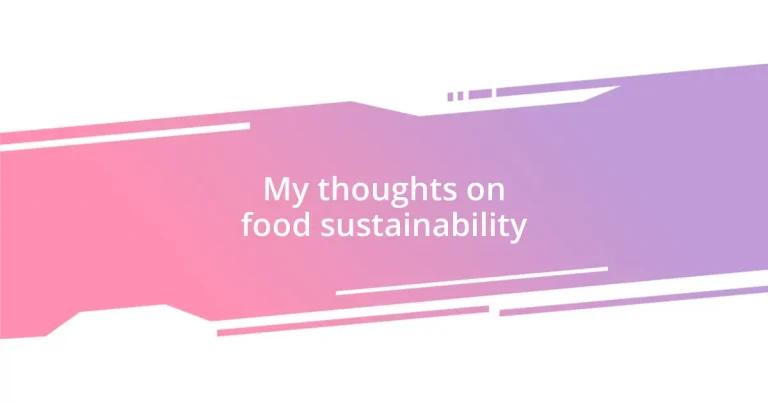Key takeaways:
- Food sustainability enhances health and happiness while offering environmental benefits and community connection.
- Key principles include prioritizing local and seasonal foods, minimizing food waste, and incorporating plant-based meals.
- Supporting local food systems fosters community resilience and can lead to stronger relationships between farmers and consumers.
- Practices like meal planning, reducing food waste, and choosing seasonal produce can create a more sustainable lifestyle and save money.
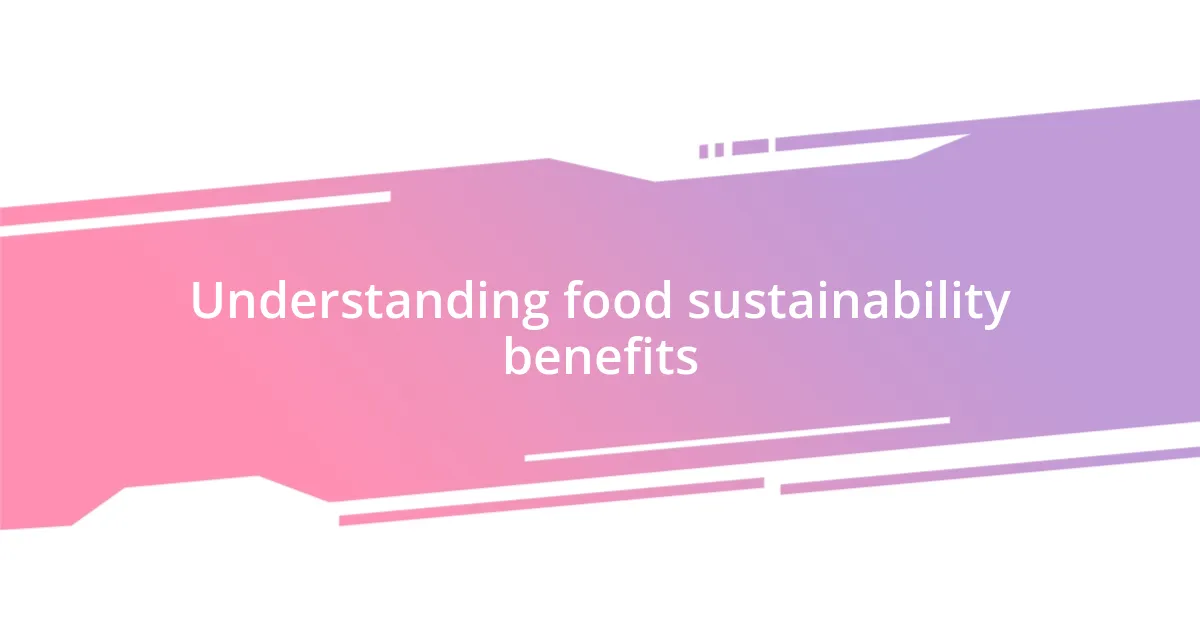
Understanding food sustainability benefits
Food sustainability offers numerous benefits that extend beyond simply being an ethical choice. When I shifted to a more sustainable diet a few years ago, I noticed not just the quality of food but also its impact on my mood. Eating locally sourced, seasonal produce was like a breath of fresh air; the flavors were vibrant and delicious, bringing a certain joy to my meals. Isn’t it fascinating how the food we consume can directly influence not just our health but our happiness?
Moreover, embracing food sustainability can lead to significant environmental benefits. I remember visiting a community garden where neighbors came together to grow their own vegetables—seeing how their collective efforts reduced waste and encouraged biodiversity was inspiring. This communal approach not only nurtured the earth but also fostered a sense of connection among people. Have you ever thought about how your food choices affect your community and the planet?
On a practical level, sustainable practices, like reducing food waste and choosing organic products, can also save us money in the long run. I once calculated the savings from meal prepping with local ingredients versus buying processed foods. It was eye-opening! The act of being mindful about what I consume has reshaped my relationship with food. Isn’t it empowering to realize that our choices can create a ripple effect, benefiting not only ourselves but also our environment and society?
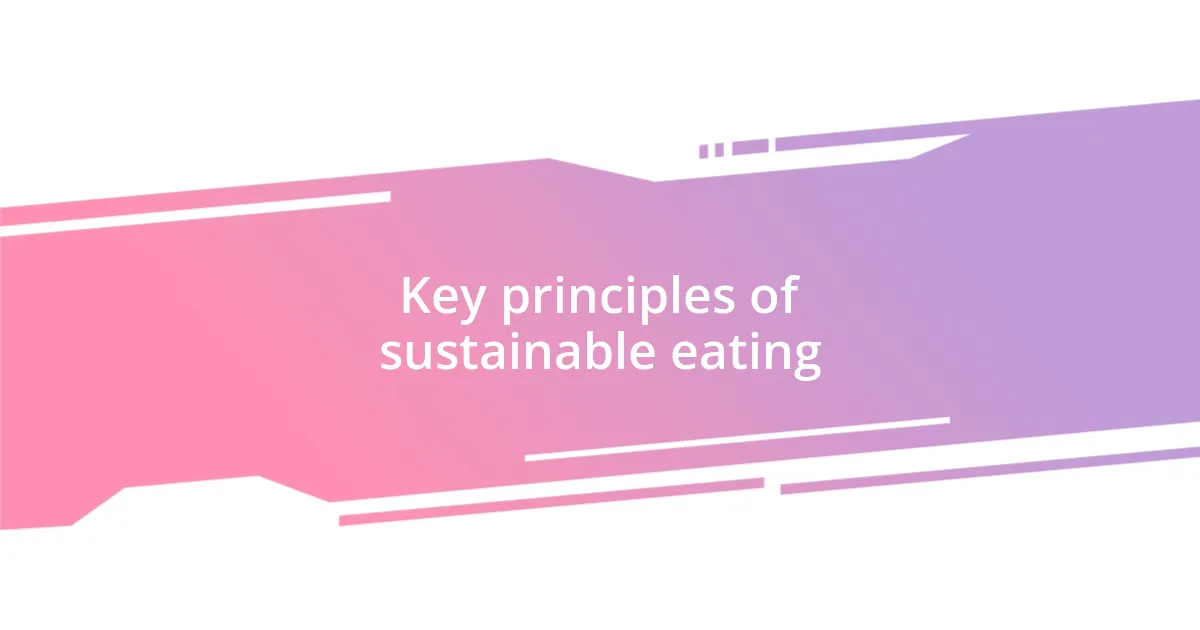
Key principles of sustainable eating
Sustainable eating is centered around several key principles that influence our choices. One principle I hold dear is prioritizing local and seasonal foods. There’s something truly special about biting into a ripe, locally grown tomato in the summer; it’s rich, juicy, and bursting with flavor. The connection to local farmers not only enhances taste but also reduces transportation emissions. Have you ever thought about how those simple choices can lead to fresher meals and a healthier planet?
Another crucial aspect is minimizing food waste. I’ve personally experienced the frustration of tossing out spoiled food from my fridge. It felt like throwing money away! By planning meals ahead and being mindful of leftovers, I’ve dramatically reduced my waste. Honestly, it’s this small act of awareness that can make a big difference. Have you noticed how much food you waste?
Incorporating plant-based meals is also a vital principle of sustainable eating. Since I started experimenting with vegetarian recipes, I’ve seen not only a positive impact on my health, but also a measurable reduction in my carbon footprint. It’s astonishing how delicious a hearty lentil stew can be, and it makes me feel good knowing I’m contributing to a more sustainable future. When was the last time you tried a meat-free meal? You might be surprised by how satisfying and flavorful it can be.
| Principle | Benefits |
|---|---|
| Local & Seasonal Eating | Fresher food, reduced emissions, supports local economies |
| Minimizing Food Waste | Saves money, reduces landfill waste, encourages mindful eating |
| Plant-Based Meals | Health benefits, lower carbon footprint, variety in diet |
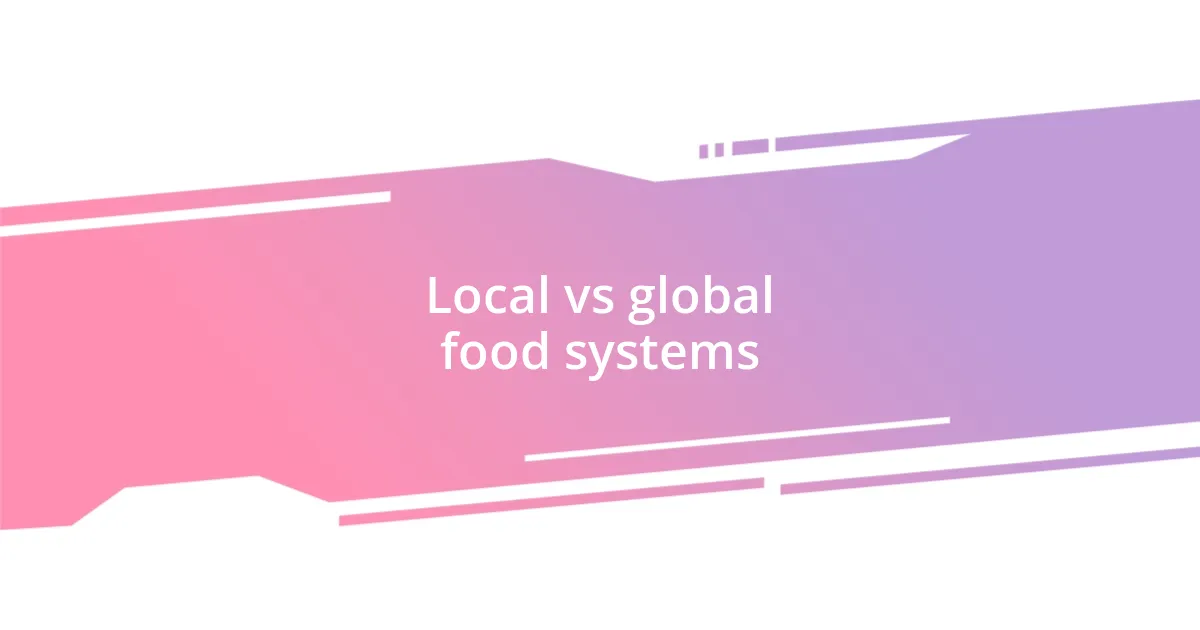
Local vs global food systems
When considering local versus global food systems, I often reflect on the small farmers I’ve met in my area. Their passion is palpable as they share stories about sustainable practices and striving to keep their crops healthy without chemical additives. It creates such a personal connection to the food I eat; each bite feels like a little piece of their labor and love. This contrast strikes me: the intimacy of local farming versus the anonymity of global supply chains, which can sometimes become bogged down by the complexities of logistics and profits.
- Local food systems often enhance community resilience by fostering relationships between farmers and consumers.
- They minimize environmental impact through reduced transportation distances and supporting biodiversity.
- Conversely, global food systems can offer more variety and lower prices but often come with hidden costs, like greater carbon emissions and potential exploitation of labor.
I vividly recall attending a local food fair where vendors showcased their harvest, complete with samples. The atmosphere was electric, filled with laughter and conversations around the importance of fresh, local produce. It struck me how purchasing from local producers helps create stronger, more sustainable communities. While global food systems have their merits, it’s the human connection and understanding behind local foods that resonate deeply with me.

Reducing food waste effectively
It’s surprising how much food I used to waste without even realizing it. One habit I’ve integrated into my routine is storing food differently. For instance, placing herbs in water keeps them fresh longer, transforming my fridge into a mini garden instead of a waste bin. Have you ever thought about how a small change in storage can make such a big difference?
Meal planning is another game-changer I’ve embraced. I remember mapping out my week’s meals on Sunday—it’s like a fun puzzle! Knowing what I’ll cook helps me shop strategically, reducing impulse buys that often lead to leftovers going bad. Have you ever tried planning your meals? It can turn shopping into a focused mission rather than a chaotic chore.
Lastly, I’ve found that sharing excess food with friends or neighbors not only prevents waste but also fosters connection. There’s something heartwarming about passing along a loaf of homemade bread or sharing leftovers after a dinner party. Doesn’t it feel good to know you’re spreading joy along with reducing waste? Every little effort counts, and sharing food can be a wonderful way to make our communities closer while cultivating a more sustainable lifestyle.
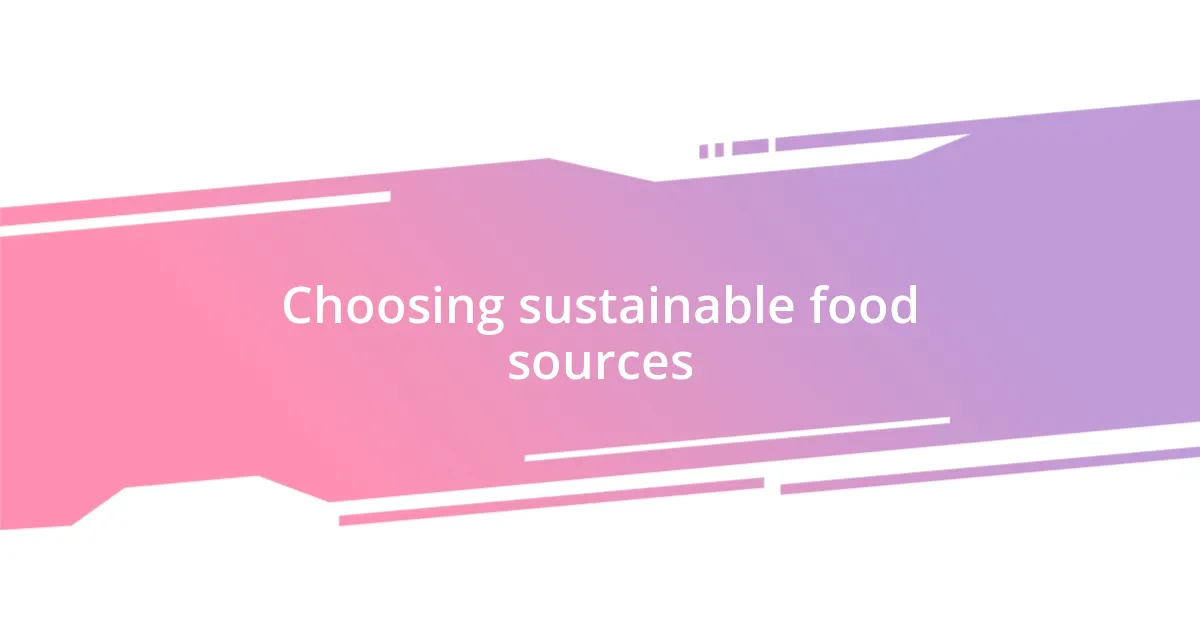
Choosing sustainable food sources
When I think about choosing sustainable food sources, I always consider the impact of my decisions on both the environment and my community. I’ve started forming a habit of reading labels carefully, looking for products that are certified organic or locally sourced. Isn’t it fascinating how these labels can tell a story about the food’s journey? Each choice reflects my values, and I feel a sense of empowerment knowing that I contribute to sustainable practices.
One thing that has really struck me is the difference in flavor when I buy seasonal produce. During the summer, I can’t resist the juicy tomatoes from the local farmer’s market. They taste so much better than the bland, out-of-season counterparts shipped from afar. Have you ever noticed how seasonal foods connect us with the rhythm of nature? It’s as if the food itself carries the spirit of the season, making every meal more meaningful.
I also make it a point to support food cooperatives and community-supported agriculture (CSA) programs. Joining a CSA was an eye-opening experience for me; receiving a box of assorted veggies each week felt like a treasure hunt. What stories lie behind each vegetable? I’ve become more adventurous in my cooking, trying new recipes that I wouldn’t have considered before. The sense of community that comes from being part of a collective is something I cherish, knowing my choices contribute to sustainable farming practices while also forging connections with like-minded individuals.
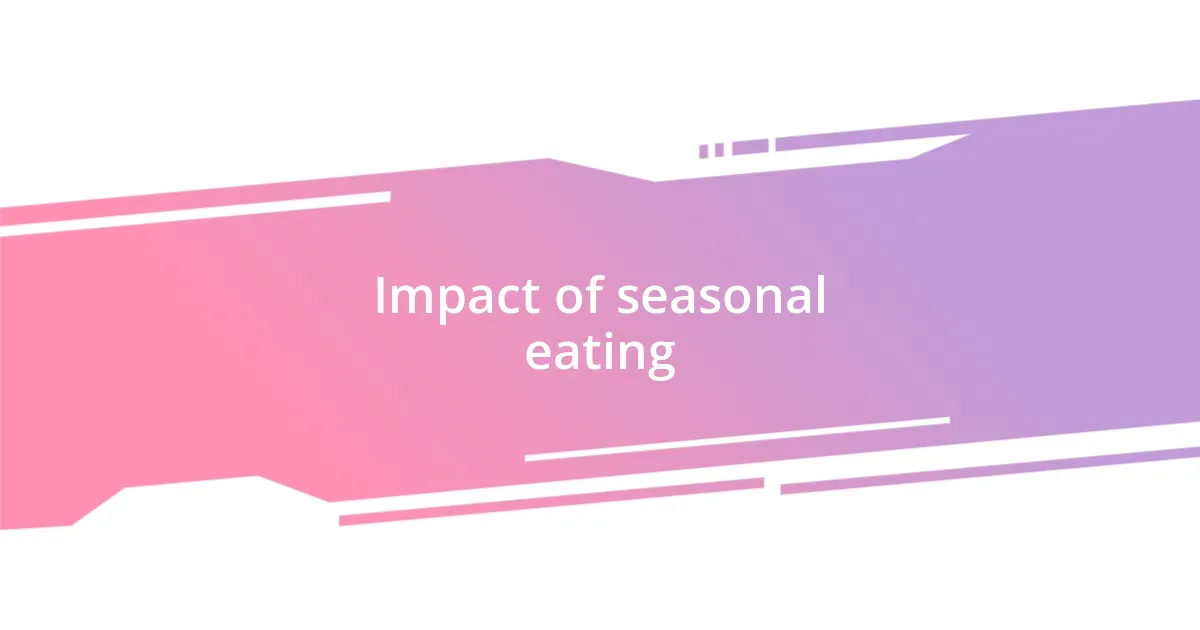
Impact of seasonal eating
Seasonal eating has profoundly influenced how I enjoy food, especially the flavors that come with each time of year. I remember savoring the crispiness of fresh apples in fall, their sweetness reminding me of childhood visits to orchards. Isn’t it incredible how nature provides us with distinct tastes that echo the seasons? It’s like being in a perpetual culinary adventure that keeps my palate excited.
I’ve also discovered that seasonal eating fosters a stronger connection to local producers. Just last summer, I visited a nearby farm and witnessed the vibrant fields bursting with ripe berries ready for harvest. It struck me how my choice to support local farms not only provides me with fresher ingredients but helps sustain my community. Does knowing where my food comes from make a difference? For me, it truly adds depth and meaning to each meal I prepare.
Moreover, I’ve found that embracing seasonal ingredients can be incredibly budget-friendly. Last winter, I focused on root vegetables, which were both fresh and affordable. Cooking a hearty stew with carrots, potatoes, and onions made me realize that eating seasonally doesn’t mean sacrificing flavor or creativity. Instead, it encourages me to explore what’s available and experiment in ways I wouldn’t have thought possible. How do you feel about turning seasonal constraints into delicious opportunities? I see them as invitations to get creative in the kitchen, transforming my meals into seasonal celebrations.

Tips for a sustainable lifestyle
Adopting a plant-based diet has been a transformative journey for me in terms of sustainability. I still remember the first time I tried making a fully plant-based dish—it was a vibrant vegetable stir-fry bursting with color. I was amazed at how satisfying it felt to swap animal products for an array of fresh veggies and grains. Have you ever considered how much water and energy is saved by choosing plant-based meals? It feels rewarding to know that even small changes can make a difference in our environmental footprint.
I’ve also started paying attention to my food waste, and let me tell you, it’s been eye-opening. For example, I now save vegetable scraps to make homemade broth. I think back to the time I used to toss those bits away without a second thought. Doesn’t it feel satisfying to find a way to minimize waste? By changing my perspective on what constitutes waste, I feel like I’m playing a more active role in creating a sustainable kitchen, and it gives me a sense of accomplishment every time I put those scraps to good use.
Another practice I’ve embraced is meal planning. Creating a weekly menu helps me utilize ingredients more effectively and reduces last-minute food purchases that often lead to waste. I recall a time when my fridge was often filled with forgotten produce that eventually went bad. Isn’t it frustrating to waste food and money? Since I started planning ahead, I not only save money but also feel organized and in control of my culinary adventures. It’s a simple step that has greatly enhanced my cooking experience and sustainability efforts.












